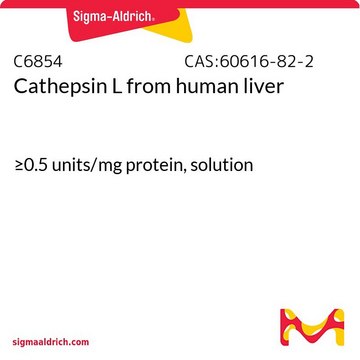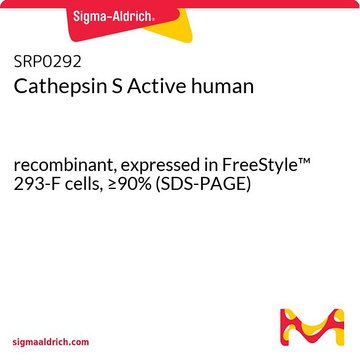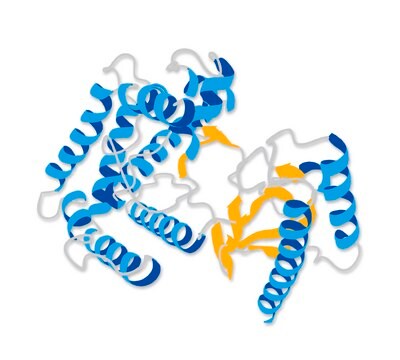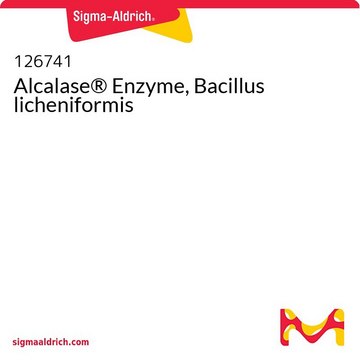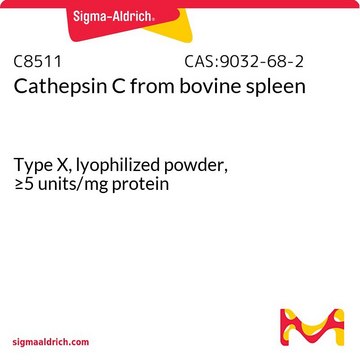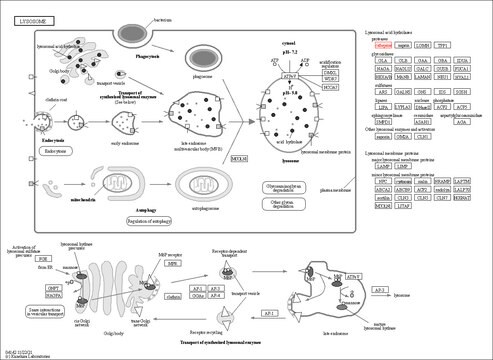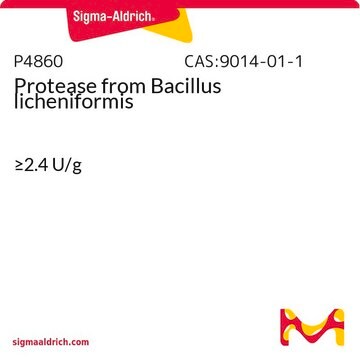219343
Cathepsin S, Human, Recombinant, E. coli
Cathepsin S, Human, Recombinant, E. coli, is prepared without a tag or fusion protein. A major lysosomal cysteine proteinase with high specific activity.
Synonym(s):
Cathepsin S Protein
Sign Into View Organizational & Contract Pricing
All Photos(1)
About This Item
Recommended Products
Quality Level
biological source
human
recombinant
expressed in E. coli
assay
≥90% (SDS-PAGE)
form
liquid
specific activity
≥30,000 mU/mg protein
manufacturer/tradename
Calbiochem®
storage condition
OK to freeze
avoid repeated freeze/thaw cycles
technique(s)
cell based assay: suitable
UniProt accession no.
shipped in
wet ice
storage temp.
−70°C
Gene Information
human ... CTSS(1520)
General description
Note: 1 mU = 1 milliunit.
Research area: Cell Signaling
Recombinant, human cathepsin S expressed in E. coli without a tag or fusion protein. A major lysosomal cysteine proteinase that is preferentially expressed in macrophages and microglia. Shown to be involved in the processing of antigenic peptides for presentation by MHC Class II molecules on the surface of antigen-presenting cells by mediating invariant (Ii) chain degradation. Inhibition of cathepsin S results in impaired antigen-presentation.
Recombinant, human cathepsin S expressed in E. coli without a tag or fusion protein. A major lysosomal cysteine proteinase that is preferentially expressed in macrophages and microglia. Shown to be involved in the processing of antigenic peptides for presentation by MHC Class II molecules on the surface of antigen-presenting cells by mediating invariant (Ii) chain degradation. Inhibition of cathepsin S results in impaired antigen-presentation.
Application
Cathepsin S, Human, Recombinant, E. coli has been used in cathepsin digestion reactions.
Biochem/physiol Actions
Cathepsin S is a cysteine protease that plays a role in degradation of class II complexes in human B lymphocytes. It possesses endoproteolytic activity and aids in processing and presenting antigens to immune cells, thereby influencing the immune response. Cathepsin S is involved in facilitating the degradation of damaged or unwanted proteins within the endo-lysosomal pathway. Dysregulation of Cathepsin S activity leads to the development of various diseases such as arthritis, cancer, and cardiovascular diseases.
Warning
Toxicity: Harmful (C)
Unit Definition
One unit is defined as the amount of enzyme that will hydrolyze 1.0 µmol Z-VVR-AMC per min at 37°C, pH 6.5. Note: 1 mU = 1 milliunit.
Physical form
In 35 mM potassium phosphate, 35 mM Sodium acetate, 2 mM DTT, 2 mM EDTA, 50% ethylene glycol, pH 6.5.
Reconstitution
Following initial thaw, aliquot and freeze (-70°C).
Other Notes
Liuzzo, J.P., et al. 1999. Mol. Med.5, 334.
Riese, R.J., et al. 1998. J. Clin. Invest.101, 2351.
Sukhova, G.K., et al. 1998. J. Clin. Invest.102, 576.
Kirschke, H., and Wiederanders, B. 1994. Methods Enzymol.244, 500.
Xin, X.Q., et al. 1992. Arch. Biochem. Biophys.299, 334.
Kirschke, H., et al. 1989. Biochem. J.264, 467.
Riese, R.J., et al. 1998. J. Clin. Invest.101, 2351.
Sukhova, G.K., et al. 1998. J. Clin. Invest.102, 576.
Kirschke, H., and Wiederanders, B. 1994. Methods Enzymol.244, 500.
Xin, X.Q., et al. 1992. Arch. Biochem. Biophys.299, 334.
Kirschke, H., et al. 1989. Biochem. J.264, 467.
Legal Information
CALBIOCHEM is a registered trademark of Merck KGaA, Darmstadt, Germany
signalword
Warning
hcodes
Hazard Classifications
Acute Tox. 4 Oral - STOT RE 2 Oral
target_organs
Kidney
Storage Class
10 - Combustible liquids
wgk_germany
WGK 1
Certificates of Analysis (COA)
Search for Certificates of Analysis (COA) by entering the products Lot/Batch Number. Lot and Batch Numbers can be found on a product’s label following the words ‘Lot’ or ‘Batch’.
Already Own This Product?
Find documentation for the products that you have recently purchased in the Document Library.
Xiao-Yu Yuan et al.
Bioorganic & medicinal chemistry, 27(6), 1034-1042 (2019-02-19)
Selective proteinase inhibitors have demonstrated utility in the investigation of cartilage degeneration mechanisms and may have clinical use in the management of osteoarthritis. The cysteine protease cathepsin K (CatK) is an attractive target for arthritis therapy. Here we report the
Our team of scientists has experience in all areas of research including Life Science, Material Science, Chemical Synthesis, Chromatography, Analytical and many others.
Contact Technical Service
